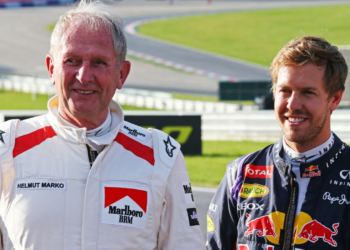Nicholas Latifi has accepted blame for his crash with Zhou Guanyu in Singapore Grand Prix, but asserts that he checked his mirrors prior to the incident.
On lap seven of last weekend’s race, the pair made contact as they approached Turn 5, forcing both cars into retirement.
Latifi moved over from the right side of the circuit to the left, where Zhou had pulled up alongside the Williams driver.
The stewards deemed Latifi at fault for the crash, and handed the Canadian driver a grid penalty for this weekend’s grand prix in Japan.
F1 drivers have long criticised the effectiveness of car mirrors, with Latifi asserting that Zhou was in his blind spot in the build-up to the incident.
“At the end watching all the different on-boards, I think, if you’re going off the rulebook, it’s clear he came up alongside me, and I didn’t leave him enough space,” Latifi said.
Latifi expressed grievance over not being able to provide his side of the story before being deemed at fault for the crash.
“I think the things that were maybe not considered, which is as well, maybe one of the frustrations that I didn’t have a chance to go to this stewards, because they didn’t ever summon me, like normally happens when there’s an incident between two drivers.
“I was taking the same line I was taking every single lap beforehand. And I did actually look into my mirrors, both ways.
“You see from the onboard that I glanced in both directions but the problem was, just because of the difference in lines, he was driving in the blind spot of the mirror the whole way down to the corner.
“So, in that sense, as drivers we all know, there’s a massive blind spot in the car. And again, I did look, so if he’s driving in a place where I can’t see him, when I do make an effort to look, and I just then take my normal line, it’s, yeah… obviously, he ended up being there.
“But if I can’t see him, because he’s driving in a place where he should expect I can’t see him, especially on a street track in the wet… so yeah, it’s tricky.”
“I mean, if I would have got penalised anyways, in the end, after being able to at least give my side of the story, I know, doesn’t really make much of a difference and I would have accepted that.
“But I guess just not being able to go to the stewards and give my side of the events and give different points that I think weren’t considered.
“That was probably a bit frustrating. We’re always talking about the consistency amongst decisions and penalties and whatnot.”









